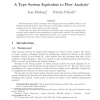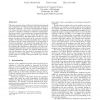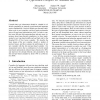120
click to vote
POPL
1995
ACM
15 years 5 months ago
1995
ACM
Flow-based safety analysis of higher-order languages has been studied by Shivers, and Palsberg and Schwartzbach. Open until now is the problem of finding a type system that accep...
186
click to vote
POPL
1995
ACM
15 years 5 months ago
1995
ACM
We show how a set of building blocks can be used to construct programming language interpreters, and present implementations of such building blocks capable of supporting many com...
114
click to vote
POPL
1995
ACM
15 years 5 months ago
1995
ACM
We present a variant of the Standard ML module system rameterized abstract types (i.e. functors returning generative types) map provably equal arguments to compattract types, inst...
123
click to vote
POPL
1995
ACM
15 years 5 months ago
1995
ACM
Traditional techniques for implementing polymorphism use a universal representation for objects of unknown type. Often, this forces a compiler to use universal representations eve...
112
click to vote
POPL
1995
ACM
15 years 5 months ago
1995
ACM
Program slicing is a technique for isolating computational threads in programs. In this paper, we show how to mechanically extract a family of practical algorithms for computing s...
POPL
1995
ACM
15 years 5 months ago
1995
ACM
102
click to vote
POPL
1995
ACM
15 years 5 months ago
1995
ACM
Obliq is a lexically-scoped, untyped, interpreted language that supports distributed object-oriented computation. Obliq objects have state and are local to a site. Obliq computati...
181
click to vote
PLDI
1995
ACM
15 years 5 months ago
1995
ACM
Compile-time type information should be valuable in efficient compilation of statically typed functional languages such as Standard ML. But how should type-directed compilation w...
126
click to vote
PLDI
1995
ACM
15 years 5 months ago
1995
ACM
The control dependence relation is used extensively in restructuring compilers. This relation is usually represented using the control dependence graph; unfortunately, the size of...



